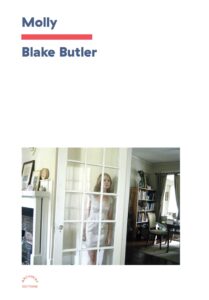
Blake Butler on (Not) Finding Your Voice
“Your only job is to find a way to secure enough time to keep throwing yourself into the void.”
This first appeared in Lit Hub’s Craft of Writing newsletter—sign up here.
I hate when I hear a writer talking about “finding their voice.” I’m sure they mean well, but for my money, confining yourself out of the gate beneath the idea that there’s a certain way you’ll need to learn to talk—much less to think, or to be—in order to have “something to say” is about as damning a condition as needing permission from Crest in order to eat. Or better yet, needing an Amazon account to educate yourself.
No one has a voice once they are dead. Words on paper assume power specifically from not needing to be attached to anything but—and the idea that they’ve been put there by someone “qualified” to narrate their experience for equally “qualified” onlookers is a condition of confinement, not expression. The worst thing one might do, then, is learn to believe that if they never crack the code on their own kind while they still can and find some kind of pasture there, they’ll be forgotten—just the same as if they never lived.
Everything you think is what you are. What you do with what you are is who you are to everyone who isn’t you. Doing what many others have already done before you in your own way isn’t a voice—it’s a performance, and guess what? Everybody else is very busy with their own performances. What do you think you know that you’d actually want to be caught dead saying anyway? Would anybody hear you if you did? Would you still be thick enough to try to say it if you knew we couldn’t hear you? What else might you become if you weren’t you?
In the end, it’s almost as if the work of writing, any shred of glory in writing, comes not from defining and pursuing one’s most formidable apparition, but rather from a private, impossible process that is meant to be remodeled step by step. It’s almost as if believing there’s a voice out there for you, that you must slay and master and present like some skinned hide, is essentially the same as death.
This is not to say there is no merit to speaking craft. Rather, it is to point out the guiding mechanisms put in place by the presiding corporate publishing landscape to assist the burgeoning “creatives” of our future to believe that the path to making sense—and therefore, finding success—must be in lockstep with the processes of branding, marketing, and publicity, lest they be left behind in mortal dust.
“OK, but what does all this mean for me?” you might be wondering. “How can I proceed to find an audience for my work if I don’t even know where I’m going?” In short: You can’t. And it’s not your job to. Your only job is to find a way to secure enough time to keep throwing yourself into the void. Your only mission among the void is to not end up like all the others, even while knowing that you will. In relinquishing the fear of irrelevance, incontinence, or even worse, your audience shifts from the marketplace—as full of “bad actors” as any “bad neighborhood”—to, as Virginia Woolf famously put it, a room of one’s own.
Honestly, I’m already feeling my spray wearing off, so I think I’d better say something actionable. Something about how someday you might be looking back and wondering how you ended up where you are even after trying with all your might to end up elsewhere. About how had you known how you’d turn out, you might have tried giving up petitioning to anyone who’d listen for their compassion, and consumed yourself instead with writing yourself out of the hole you couldn’t feel sliding up around your ankles, your hips, your neck, your mind, your life.
Guess what I’m thinking about now? That scene in the Facebook origin story movie where Justin Timberlake tells the CEO, CFO, and Girlfriend of the CFO of Facebook that they don’t even know what Facebook is yet. Which comes before the scene where he gets caught by the cops doing coke off a minor belly-ring-laden belly. Which signifies that my roleplay as your facilitator has been compromised. Like all strange things, you should take all of what I’ve said here and try to erase it from your memory before it makes you something you’ll regret. Or otherwise destroys you, like all good words should. I’ll wait.
Oh hey, you’re back! I’m so glad you were able to free yourself of any association with my mentality as derived from on the precipice of my own dissolution into 1s and 0s. Not your grandma’s clickbait, is it? No. It’s mine. And what’s mine is yours, at least I hope. How about you? What does your clickbait tell you to do today?
_______________________________________________

Molly by Blake Butler is available now via Archway Editions.
Blake Butler
Blake Butler is the author of nine book-length works, recently including Alice Knott (Riverhead) and Aannex (Apocalypse Party), as well as the nonfictional Nothing: A Portrait of Insomnia (Harper Perennial). His short fiction, interviews, reviews, and essays have appeared widely, including in The Believer, The New York Times, Bomb, Bookforum, and as an ongoing column at Vice. He recently began blogging on Substack at Dividual.



















